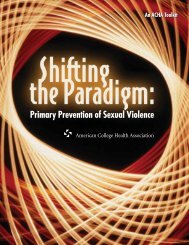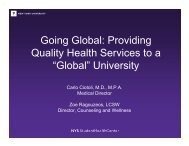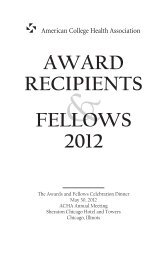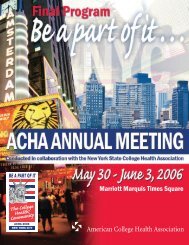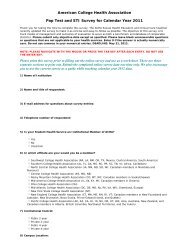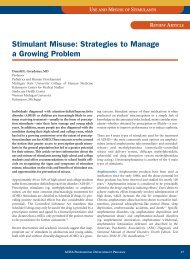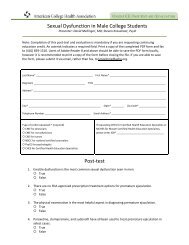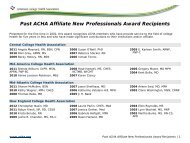final program 2005.qxp - American College Health Association
final program 2005.qxp - American College Health Association
final program 2005.qxp - American College Health Association
Create successful ePaper yourself
Turn your PDF publications into a flip-book with our unique Google optimized e-Paper software.
Thursday, June 2, 2005<br />
<br />
8:00 AM - 9:30 AM (cont.)<br />
Education (SPHPHE) can be used to<br />
support, revise, and plan effective HIV<br />
risk reduction initiatives.<br />
4. Compare the impact of the Ecological<br />
Model and ACHA SPHPHE on the planning<br />
process for two different universities.<br />
Presenters: Sarah Mart, MS, MPH, and Mary<br />
Grace Almandrez, MS (University of San Francisco);<br />
Susan Kennedy, PhD (Pennsylvania State University)<br />
Presider: Jamie Shutter, MSEd, CHES (University of<br />
Texas)<br />
Facilitator: Justin Laird, PhD (State University of New<br />
York-Brockport)<br />
37 TH289. Improving the Quality of<br />
Life of the Person with HIV/AIDS<br />
CME: 1.5 CH: 1.8 CECH: 0 PsyCE: 0<br />
AAFP-P: 1.5 PhCE: 0<br />
Room: Sunset<br />
The attendee should be able to:<br />
1. Identify the Quality of Life indicators<br />
that are gender specific.<br />
2. Discuss a causal model related to the<br />
quality of life for a person with<br />
HIV/AIDS.<br />
3. Describe how the findings can be used<br />
by the health care provider to assist the<br />
person with HIV/AIDS in improving<br />
their quality of life.<br />
Presenter:Anna K. Omery, RN, DNSc (Kaiser<br />
Permanente)<br />
Presider: Kathy Chan, PA-C (Morgan State<br />
University)<br />
Facilitator:Anita Barkin, DrPH, CRNP (Carnegie<br />
Mellon University)<br />
38 TH294. Presidential Session I:<br />
The Spirit, Science, and Practice of<br />
Holistic <strong>Health</strong> Promotion<br />
CME: 1.5 CH: 1.8 CECH: 1.5 PsyCE: 1.5<br />
AAFP-P: 1.5 PhCE: 0<br />
Room: Golden Ballroom<br />
The attendee should be able to:<br />
1. List some of the major scientific discoveries<br />
that have changed our understanding<br />
of health, illness, healing, and<br />
the process of change.<br />
2. Discuss the limitations of interventions<br />
based on our often-outdated scientific<br />
understandings of health, illness, and the<br />
process of change.<br />
3. Describe the implications for health<br />
education of these new scientific understandings.<br />
Presenter: Jon I. Robison, PhD, MS (Michigan State<br />
University<br />
Presider: Nancy Allen, MA, CHES (Michigan State<br />
University)<br />
39 TH302. Student <strong>Health</strong> Insurance<br />
on Campus: The Current Landscape and<br />
Proposals To Increase Coverage<br />
CME: 1.5 CH: 1.8 CECH: 1.5 PsyCE: 0<br />
AAFP-P: 1.5 PhCE: 0<br />
Room: Pacific Salon 2<br />
The attendee should be able to:<br />
1. Discuss the range of approaches currently<br />
utilized by colleges to require<br />
health insurance coverage for some or<br />
all students.<br />
2. Identify policy options available to<br />
colleges and states to increase health<br />
insurance coverage of students.<br />
3. Explain how a policy-making model was<br />
used to affect the adoption of a mandatory<br />
‘hard waiver’ policy.<br />
4. Discuss how the principles of the<br />
model can be used as a guide for affecting<br />
other types of health policy changes<br />
on a college campus.<br />
Presenters: Stacey L. Pogue (University of Texas);<br />
Anita Barkin, MSN, DrPH (Carnegie Mellon<br />
University)<br />
Presider: David Rousmaniere, MBA (Louisiana<br />
State University)<br />
Facilitator: Katrin Wesner, CAPPM (Rensselaer<br />
Polytechnic Institute)<br />
10:00 AM - 11:30 AM<br />
40 TH005. SMART Recovery and the<br />
Need for Non-12-Step Recovery Options<br />
CME: 1.5 CH: 1.8 CECH: 1.5 PsyCE: 1.5<br />
AAFP-P: 1.5 PhCE: 0<br />
Room: Pacific Salon 2<br />
The attendee should be able to:<br />
1. Describe the U.S. addiction support<br />
group options currently available.<br />
2. Explain the scientific evidence supporting<br />
the effectivness of addiction treatment<br />
and addiction support groups.<br />
3. Discuss the rationale the courts have<br />
used to define Alcoholics Anonymous<br />
as a religion.<br />
4. Describe how to establish a collaborative<br />
approach for addiction treatment<br />
and recovery planning.<br />
Schedule of Programs and Events<br />
SCHEDULE OF PROGRAMS AND EVENTS<br />
Presenter:Arthur Tom Horvath, PhD (SMART<br />
Recovery)<br />
Presider: Eleanor Davidson, MD (Case Western<br />
Reserve University)<br />
Facilitator: Kathleen MacLachlan,ANP (Syracuse<br />
University)<br />
41 TH027. Emergency Contraception:<br />
Patterns, Perceptions, and Paradigms<br />
CME: 1.5 CH: 1.8 CECH: 1.5 PsyCE: 0<br />
AAFP-P: 1.5 PhCE: 1.5 contact hours (<strong>program</strong> no: 067-<br />
999-05-021-L04)<br />
Room: Pacific Salon 1<br />
The attendee should be able to:<br />
1. Discuss ways to improve knowledge of<br />
and access to emergency contraception<br />
(EC).<br />
2. Identify methods to create opportunities<br />
to engage patients and encourage<br />
informed choices regarding contraceptive<br />
selection.<br />
3. Explain the implications of open access<br />
to EC and opportunities to affect positive,<br />
healthy behavioral choices.<br />
Presenters: Carl K. Labbe, BSPharm, RPh, and Ann<br />
Ryan, MS, FNP (Arizona State University)<br />
Facilitator: Deirdre Younger, RPh, MS (University of<br />
Maryland-<strong>College</strong> Park)<br />
42 TH084. The Men’s Program: A<br />
Model Peer Education Program for<br />
Lowering Men’s Likelihood of Raping<br />
CME: 1.5 CH: 1.8 CECH: 1.5 PsyCE: 0<br />
AAFP-P: 1.5 PhCE: 0<br />
Room: Sunrise<br />
Sponsored by the <strong>American</strong> <strong>College</strong><br />
<strong>Health</strong> Foundation Murray DeArmond<br />
Student Activity Fund<br />
The attendee should be able to:<br />
1. Identify research-proven techniques for<br />
educating men about rape.<br />
2. Discuss common reactions of college<br />
men to <strong>program</strong>ming that focuses on<br />
rape prevention and education.<br />
3. Explain how to succesfully inspire<br />
college men to become involved in<br />
sexual assault prevention and peer<br />
education.<br />
Presenters: John L. Mallory, Matthew J. Roosevelt,<br />
Nick M. Reiter, and William C. Carter (<strong>College</strong> of<br />
William and Mary)<br />
Page 37


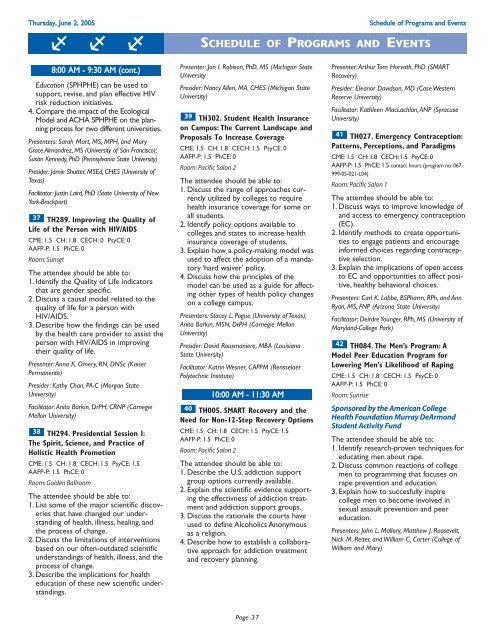
![Final Program [5.4MB pdf] - American College Health Association](https://img.yumpu.com/49022356/1/190x245/final-program-54mb-pdf-american-college-health-association.jpg?quality=85)
